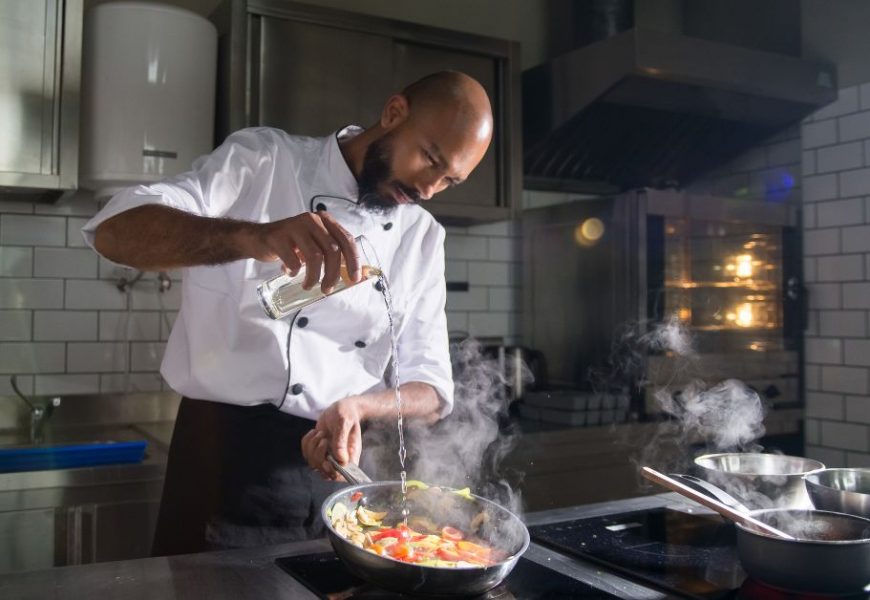The role of an Executive Chef is one of the most prestigious positions in the culinary world, commanding respect and skill. This leadership role involves not only mastering cooking techniques but also overseeing kitchen operations, menu creation, and staff management, making it a pivotal part of any successful restaurant or culinary establishment.
In this article, we will explore the journey of how to become a master chef, delving into the executive chef job description, and detailing the various executive chef job responsibilities. Whether you’re a culinary student or an aspiring chef, this guide will provide valuable insights into the skills and experiences needed to excel in this demanding yet rewarding profession.
Table of Contents:
- What Does an Executive Chef Do?
- Educational Path to Becoming an Executive Chef
- Building Experience in the Culinary Industry
- Developing Leadership and Business Skills
- From Sous Chef to Executive Chef
- How Long Does It Take to Become an Executive Chef?
- Conclusion
What Does an Executive Chef Do?
Overview of Responsibilities
An Executive Chef is a key person in a restaurant, mainly responsible for planning the menu, managing staff, and supervising food preparation. They create exciting menus that match the restaurant’s style and make sure the dishes are of high quality. This includes working with kitchen staff, assigning tasks, and ensuring that food is prepared efficiently and meets top standards.
Leadership Role
As a leader in the kitchen, the Executive Chef is responsible for guiding and motivating the culinary team. They create a team-oriented atmosphere, offering support and advice to help everyone work together effectively. They also work with restaurant owners and management to ensure that the kitchen’s activities fit with the overall goals of the business, making sure the restaurant’s culinary vision is achieved.
Business Acumen
In addition to cooking skills, an Executive Chef needs good business knowledge. This means managing food costs, finding high-quality ingredients, and keeping quality standards high. By balancing creativity with smart financial choices, they help the restaurant make a profit while providing great dining experiences for customers.
Educational Path to Becoming an Executive Chef
Culinary School: Enrolling in a respected culinary school is a key step for anyone aiming to become an Executive Chef. These schools offer formal training in culinary arts, covering essential cooking methods, food safety, and kitchen management skills. Notable culinary institutions like the Culinary Institute of America, Le Cordon Bleu, and Johnson & Wales University provide comprehensive programs that help students hone their culinary skills and prepare for a successful career in the kitchen.
Certifications and Degrees: Along with a culinary degree, aspiring Executive Chefs can boost their credentials by obtaining relevant certifications and taking specialized courses. A diploma in culinary arts serves as a solid foundation, while certifications in areas like food safety, nutrition, and kitchen management can enhance expertise. Additionally, specialized courses in menu planning, cost control, and leadership are valuable, equipping future Executive Chefs with the skills needed to thrive in their positions and manage a kitchen effectively.
Building Experience in the Culinary Industry
- Starting at Entry-Level Positions: To begin a successful career in cooking, it’s important to start with entry-level jobs like line cook, prep cook, or kitchen assistant. These positions give you hands-on experience and help you learn how a kitchen works. Working in a busy kitchen teaches you teamwork and the flow of service, which is essential for moving up in your career.
- Gaining Skills in the Kitchen: As you gain more experience, focus on learning different cooking skills. This includes mastering cooking techniques, understanding flavours, and exploring various cuisines. Taking on new tasks in the kitchen will build your confidence and make you a more skilled chef. Trying out new recipes and ingredients can also spark your creativity, which is very important for an Executive Chef.
- Learning Management Skills: Besides cooking skills, future Executive Chefs should learn how to manage a kitchen well. This means knowing how to lead a team, communicate clearly, and assign tasks. It’s also important to understand inventory, budgeting, and cost control to keep the kitchen running smoothly and profitably. Taking on leadership roles or attending management training can help you build these important skills for your future career.
Developing Leadership and Business Skills
- Leadership Training: To be a great Executive Chef, you need strong leadership skills. You can build these skills by taking classes or workshops that teach you how to manage a team, communicate well, and motivate others. Good leaders inspire their team, solve problems, and create a friendly work environment where everyone can work together.
- Business Knowledge: Knowing about the business side of a kitchen is just as important as cooking. Aspiring Executive Chefs should learn about budgets, costs, and financial planning. Understanding these topics will help you make smart choices to keep the kitchen running well while serving high-quality food.
- Customer Service and Branding: Good customer service is very important in the restaurant industry. Executive Chefs should know how to make guests feel welcome and ensure they have a great experience. Understanding branding helps you promote your restaurant’s image and values, which includes knowing who your customers are and what makes your restaurant special. This way, you can attract and keep loyal customers.
From Sous Chef to Executive Chef
Becoming an Executive Chef has some great rewards. One of the best things about this job is the creative freedom you get to come up with unique menus and try out new flavours. You can show off your cooking style and bring your ideas to life. Plus, many Executive Chefs find a lot of job satisfaction because they get to see people enjoy their food. On top of that, this position usually comes with a good salary, making it a fulfilling and rewarding career.
How Long Does It Take to Become an Executive Chef?
Becoming an Executive Chef usually takes a few years, starting with your education. Most chefs begin by attending a culinary school, which can take about 1 to 2 years. After that, you’ll need to get hands-on experience in the kitchen. Working as a line cook or in other entry-level positions typically takes an extra 3 to 5 years. During this time, you’ll pick up essential cooking skills and learn how to manage kitchen tasks.
The time it takes can depend on a few things, like the opportunities you get, how hard you work, and the choices you make in your career. Some chefs might climb the ladder quicker by stepping into leadership roles or taking specialized courses, while others may take a bit longer based on their situation. With dedication and passion, you can reach your goal of becoming an Executive Chef!
Conclusion
To wrap it up, becoming an Executive Chef is a journey that takes effort and dedication but can be very rewarding. How do you become a master chef? First, you should start by going to a good culinary school to learn the basics of cooking and how to run a kitchen. Then, gain experience in entry-level jobs to understand how a kitchen works and build your skills.
As you move forward, focus on improving your cooking abilities, learning about the business side of restaurants, and developing your leadership skills. Knowing the executive chef job description and what the job involves will help you prepare for this important role. With hard work and a love for cooking, you can achieve your goal of becoming an Executive Chef and enjoy the creativity and satisfaction that comes with it.
(Visited 631 times, 1 visits today)
Popular Search
Top 10 DJ India
Makeup Steps
Advantages of Makeup
Interior Designer Salary
Makeup Artist Course
Benefits Of Photography
Hospital Waste Management
Types of Fashion Designing
Types of Lenses in Photography
How to Become a Radio Jockey
Best Nutrition Courses in India
Importance of Media Management
How To Become a Dietitian in India
Importance of Nutrition in Health
Interior Design History and Origins
Top 10 Famous Interior Designers
Top 10 Music Labels in India
Top 10 Best Animation Studios in India
Top 10 Nutraceutical Companies in India
Top 10 Fashion Designers in the World
How To Write a TV Commercial Script
Top 10 Career Opportunities in Fashion Designing
Advantages and Disadvantages of Animation



















